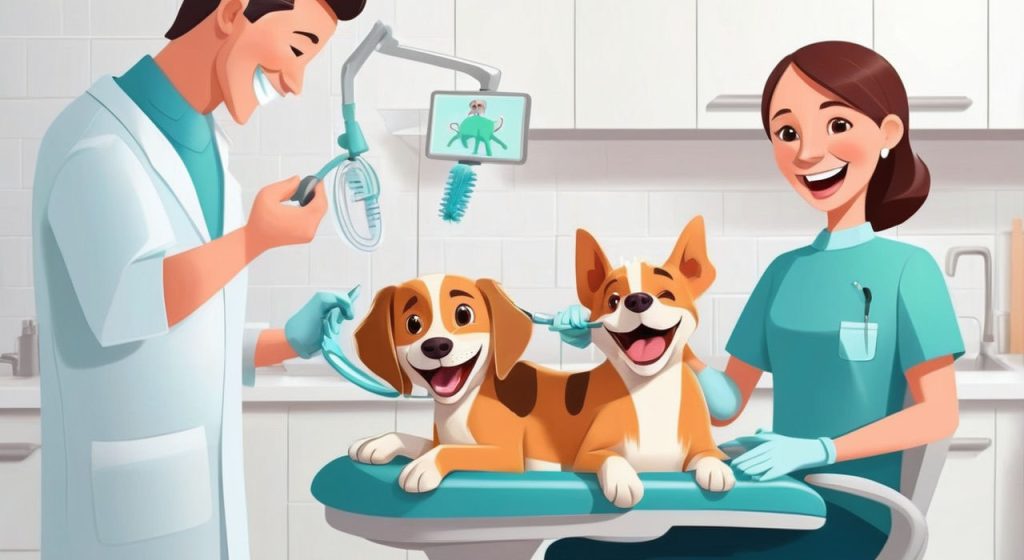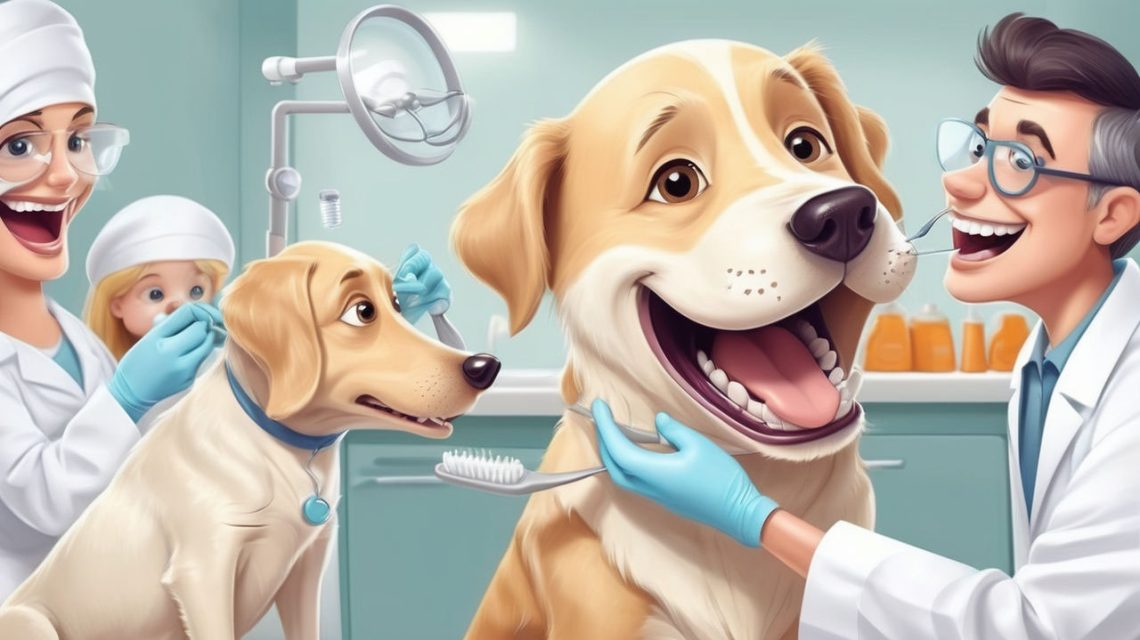Canine Dental Care: Essential Tips for a Healthy Smile
Your dog’s dental health is a crucial part of their overall well-being. Just like humans, dogs can suffer from gum disease, tooth decay, and bad breath if their teeth aren’t properly cared for. Yet, many pet owners overlook regular canine dental care, not realizing that neglecting their dog’s teeth can lead to more than just dental issues—it can also affect their heart, liver, and kidneys.
In this article, we’ll explore the importance of dental care for dogs, the steps you can take to keep their teeth clean, and the benefits of regular check-ups with your veterinarian. With the right care, you can ensure your dog enjoys healthy teeth and gums throughout their life.
Why Canine Dental Care is Essential
Good oral hygiene is about more than just a fresh breath—it’s about preventing serious health issues that can develop when dental problems go untreated. Without regular care, plaque builds up on your dog’s teeth, which hardens into tartar. This leads to periodontal disease, which affects the gums and supporting structures of the teeth.
1. Preventing Gum Disease
Gum disease is one of the most common health issues in dogs, affecting about 80% of them by the time they reach age three. It starts with plaque, a sticky film of bacteria that forms on the teeth. If left untreated, it can lead to tartar buildup, gum inflammation, and eventually tooth loss.
- Tip: Regular brushing and dental chews can help prevent plaque buildup and reduce the risk of gum disease.
2. Reducing the Risk of Systemic Health Problems
Bacteria from untreated gum disease can enter your dog’s bloodstream and travel to their heart, kidneys, and liver, causing serious infections. By taking care of your dog’s teeth, you’re not only protecting their mouth but also helping to prevent these life-threatening conditions.
3. Ensuring a Longer, Healthier Life
Good dental care can add years to your dog’s life. Dogs with healthy teeth and gums are less likely to suffer from chronic pain or systemic diseases. Regular cleanings and preventive care ensure your dog stays healthy and happy for as long as possible.
Signs Your Dog Needs Dental Care
It can be hard to tell when your dog is experiencing dental problems because they often hide pain. However, there are a few key signs to watch for that may indicate your dog needs dental care.
1. Bad Breath
If your dog’s breath smells foul, it’s often a sign of bacteria buildup in the mouth. While it’s normal for dogs to have some odor, persistent bad breath could mean gum disease or tooth decay is present.
2. Difficulty Chewing or Eating
If your dog is chewing more slowly, avoiding hard food, or dropping food from their mouth, they may have dental pain. Broken, decayed, or infected teeth can make eating uncomfortable and should be addressed by a vet.
3. Red, Swollen, or Bleeding Gums
Healthy gums should be pink and firm. If your dog’s gums are red, swollen, or bleed easily, it’s a sign of gingivitis or advanced gum disease. These symptoms should be treated quickly to prevent further damage.
- Tip: Regularly check your dog’s mouth for signs of gum inflammation or tartar buildup and schedule vet visits if you notice any problems.

How to Care for Your Dog’s Teeth at Home
At-home dental care is one of the best ways to prevent dental problems and keep your dog’s mouth healthy. With a few simple steps, you can maintain your dog’s dental hygiene between vet visits.
1. Brush Your Dog’s Teeth Regularly
Brushing your dog’s teeth is the most effective way to remove plaque and prevent tartar buildup. Use a dog-specific toothbrush and toothpaste, as human toothpaste can be harmful to pets. Start slow, getting your dog used to the process, and gradually build up to brushing several times a week.
- Tip: Choose a flavored toothpaste that your dog enjoys to make the experience more pleasant for both of you.
2. Use Dental Chews and Toys
Dental chews and toys are great for promoting oral health because they encourage chewing, which helps remove plaque and tartar from your dog’s teeth. Look for products approved by the Veterinary Oral Health Council (VOHC), which certifies dental products that effectively reduce plaque and tartar.
- Tip: Rotate different dental chews and toys to keep your dog interested and engaged.
3. Provide a Healthy Diet
Feeding your dog a balanced diet can also support their dental health. Crunchy kibble helps scrape plaque off the teeth, while certain treats and dental diets are designed specifically to promote oral health. Avoid feeding your dog too many sugary or sticky treats that can contribute to tooth decay.
The Importance of Professional Dental Cleanings
While at-home care is crucial, it’s not enough to maintain your dog’s oral health on its own. Regular professional cleanings by a veterinarian are essential for removing tartar buildup below the gum line, where it’s hard to reach with brushing alone.
1. What Happens During a Professional Cleaning?
During a professional dental cleaning, your dog will be placed under anesthesia to ensure they’re comfortable while the vet thoroughly cleans their teeth. The vet will use specialized tools to remove plaque and tartar, polish the teeth, and examine the mouth for any signs of disease or damage. They may also perform dental X-rays to check for problems below the gum line.
2. How Often Should Dogs Get Their Teeth Cleaned?
Most dogs benefit from a professional cleaning once a year, though some may need more frequent cleanings depending on their breed, age, and dental health. Small breeds and dogs prone to dental problems may require cleanings every six months to prevent issues.
How Age Affects Your Dog’s Dental Care Needs
A dog’s dental care needs change as they age. Puppies, adults, and senior dogs all require different levels of attention when it comes to their teeth and gums.
1. Puppy Dental Care
Puppies lose their baby teeth between 3 and 6 months of age, and during this time, their gums may be sensitive. While brushing isn’t as crucial for puppies, getting them used to the routine of dental care early will make it easier to care for their adult teeth later.
2. Adult Dog Dental Care
By the time your dog reaches adulthood, regular brushing, dental chews, and professional cleanings should be part of their routine. Keep an eye on any changes in their eating habits or breath, as these could indicate dental issues.
3. Senior Dog Dental Care
Senior dogs are more prone to dental issues, including tooth decay, gum disease, and tooth loss. Regular vet visits and cleanings become even more important as your dog ages, and you may need to adjust their diet if they have lost teeth or have sensitive gums.
- Tip: If your senior dog has trouble chewing hard food, consider switching to softer kibble or adding wet food to their diet.
FAQs About Canine Dental Care
How often should I brush my dog’s teeth?
- Ideally, you should brush your dog’s teeth daily, but even brushing a few times a week can significantly improve their oral health.
What if my dog won’t let me brush their teeth?
- If your dog resists brushing, start slow by getting them comfortable with the toothbrush. You can also use dental chews, toys, or oral rinses as alternatives, but it’s still important to try to introduce brushing over time.
How do I know if my dog has dental problems?
- Watch for signs like bad breath, difficulty chewing, or red and swollen gums. Regular check-ups with your vet can help catch problems early.
Can diet affect my dog’s dental health?
- Yes, feeding your dog a balanced diet and providing dental-friendly treats can help prevent plaque buildup and improve their oral health.
How much does a professional dental cleaning cost?
- A professional dental cleaning for dogs typically costs between $200 and $500, depending on the clinic, location, and any additional treatments needed.


